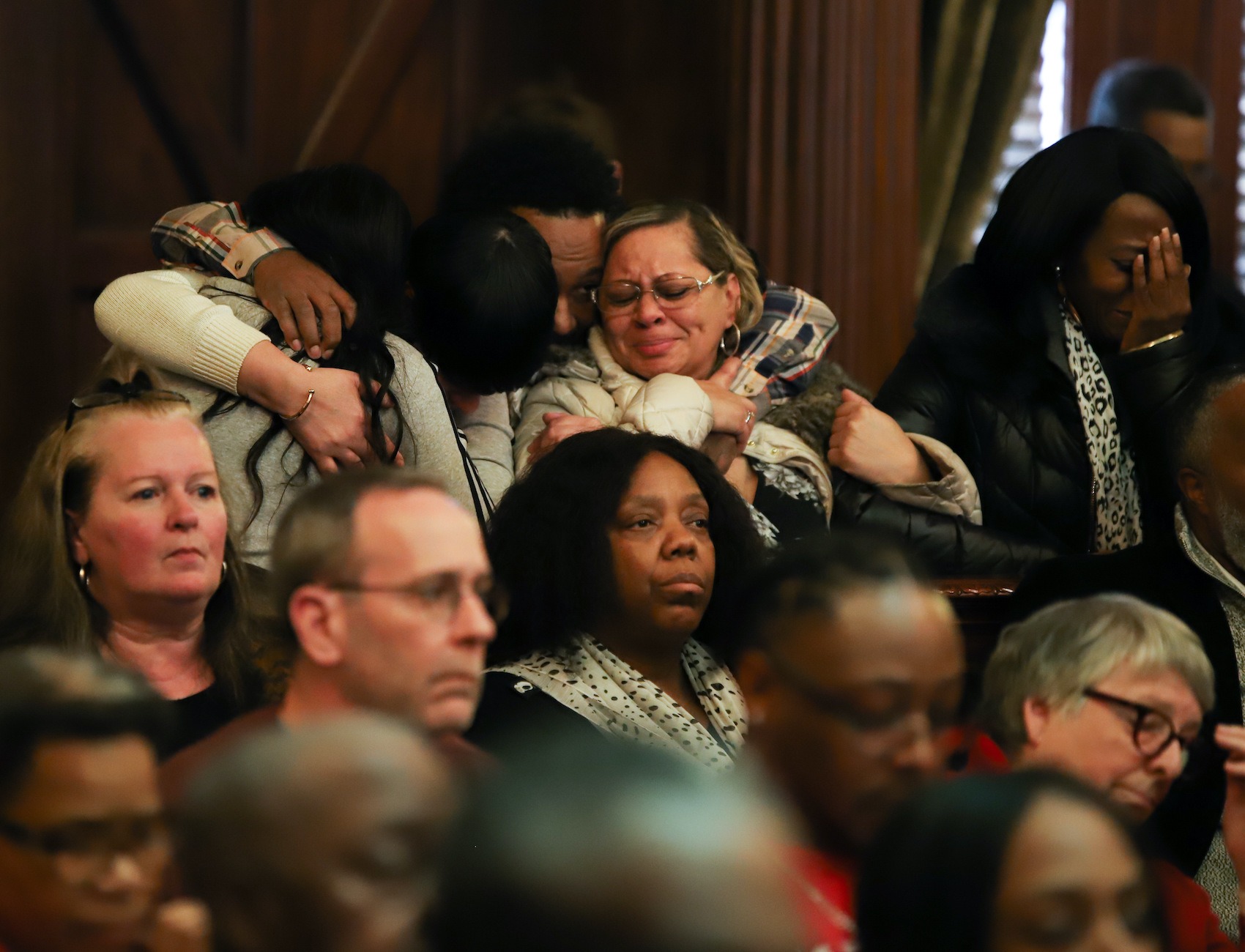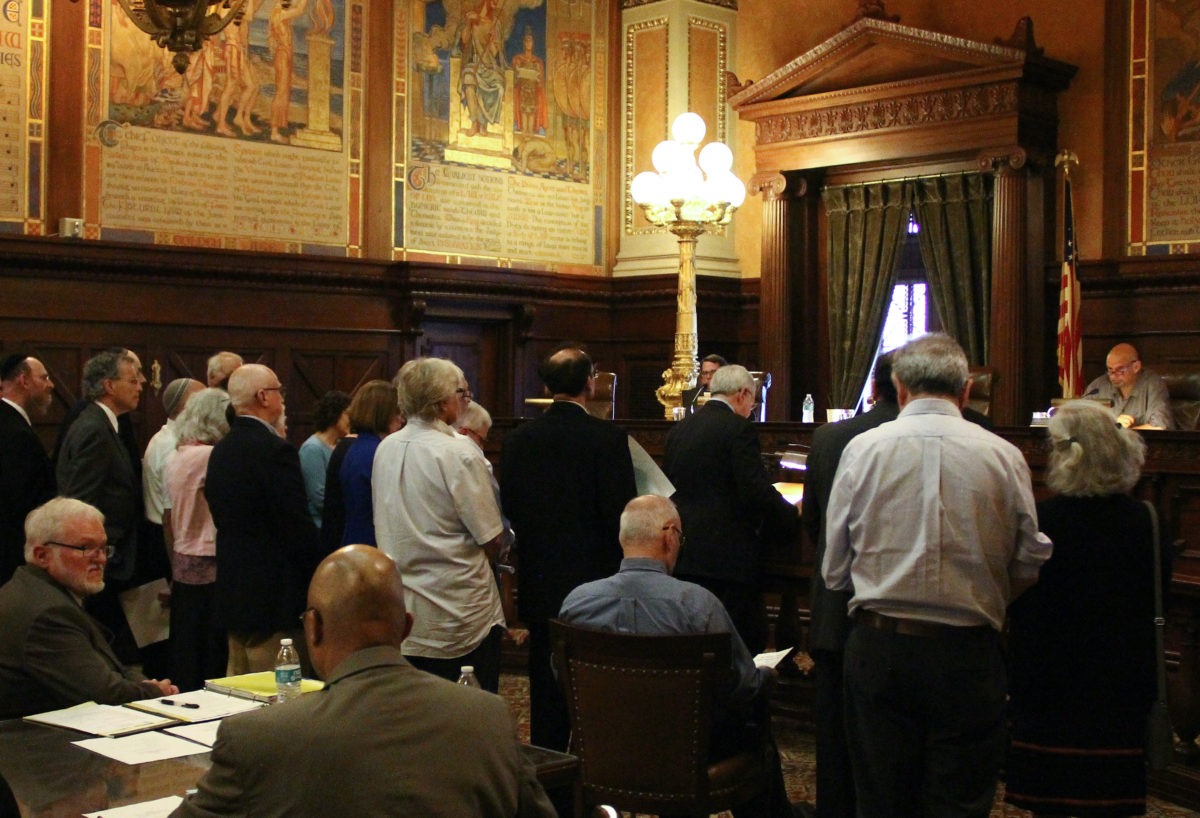Three Pennsylvania Men Were Recommended for Commutations. They’re Still in Prison.
Freddy Butler, Oliver Macklin, and Charles Goldblum are among the 17 people who received recommendations for commutations of life sentences in 2019, but Governor Tom Wolf has yet to sign off on their releases.

Just before Christmas in 2019, Freddy Butler received what very few people serving life without the possibility of parole in Pennsylvania get: an opportunity for a second chance.
Butler, who is 72 years old, was convicted of first-degree murder in 1970 for a 1968 stabbing death in Montgomery County. Inside a standing-room-only courtroom on December 20 at the Capitol in Harrisburg, Butler’s family and friends embraced and cried in joy when the state’s five-member Board of Pardons voted on a recommendation of commutation for Butler. On the day of his hearing, he had been incarcerated for more than 50 years.
But nearly five months later, Butler is still in prison at State Correctional Institution Phoenix in Montgomery County.
He is one of 17 people who received a recommendation for a commutation of a life sentence from the Board of Pardons in 2019. He is also one of three men whose ticket home is still sitting on Governor Tom Wolf’s desk.
Oliver Macklin, 63, was convicted of second-degree murder in 1986 in Philadelphia for allegedly participating in a home invasion where a person inside was shot and killed during a scuffle. He received a recommendation for commutation the same day as Butler.
Charles Goldblum, 71, was convicted of first-degree murder in 1977 in Allegheny County for allegedly helping lure a man to a parking garage in Pittsburgh where he was stabbed to death.
Goldblum, who applied for a commutation seven times before, was one of nine people recommended for a commuted sentence by the Board of Pardons in September; of those, he is the only one still in prison.
“Anyone fortunate enough to make it through the rigorous commutation process and receive a unanimous vote of approval should be transitioned back into society as quickly as possible,” Ryan Allen Hancock, co-founder and board chair of the Philadelphia Lawyers for Social Equity, told The Appeal. “It is critical for society as a whole to see those in power prove that people are redeemable and deserve a second chance to succeed.”
According to Wolf’s spokesperson Sara Goulet, the recommendations for Butler and Macklin are going through an internal review by the governor’s office. The review of Goldblum’s case has been completed, but he is still awaiting Wolf’s approval.
On average, Wolf signed commutations of life sentences within 64 days of the board recommendations in 2019. So far, Butler and Macklin have been waiting on Wolf for roughly 150 days, and Goldblum has been waiting for roughly 250 days.
Goulet did not provide any expected time frame for when Wolf would make a final determination on any of these cases.
“It is inexplicable and inexcusable,” Bret Grote, legal director for the Abolitionist Law Center, told The Appeal. “Wolf needs to be clearing the prisons out by the thousands on public health and racial justice grounds. Instead, he is dawdling on even the easiest cases.”

Since taking office in 2015, Wolf has granted 19 commutations of life sentences. Aside from Butler, Goldblum, and Macklin, he has approved every person recommended by the Board of Pardons.
Wolf approved 14 of those commutations after John Fetterman took over as lieutenant governor in January 2019. Fetterman ran on a platform of revitalizing the Board of Pardons and was able to get more commutations from life sentences approved by the board in one year than it approved in the previous 20 years combined.
Fetterman said he wants to maximize opportunities for second chances for as many deserving people as possible during his tenure.
“Justice to me would suggest to me that those [deserving] individuals, and society, are better served by not having them die in prison,” Fetterman told The Appeal in December. “That’s what this whole process is all about, discovering who those individuals are, getting them to the governor’s desk, and allowing them to reemerge as many as 52 years in prison.”
At September’s commutation hearings, nine people were approved for release, a high water mark in recent years. But in December, the Board of Pardons approved only two people for release.
Commutation hearings of life sentences were postponed in March and put on indefinite hold in late April because of COVID-19.
As of May 15, more than 30 incarcerated people at SCI Phoenix, where Butler is held, have tested positive for the virus, and three people there have died from the virus.
Like everyone incarcerated in Pennsylvania’s state prisons, Butler, Macklin, and Goldblum are locked in their cells for 23 hours a day in an effort to mitigate the spread of the disease.
“COVID-19 has spread most rapidly inside jails and prisons and can kill in a matter of days,” Grote said. “When torture or death are the alternatives to freedom, there can be no greater urgency to act.”
Correction: An earlier version of this article misstated the offense for which Charles Goldblum was convicted in 1977. He was convicted of first-degree murder, not second-degree murder.
